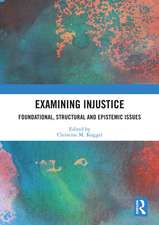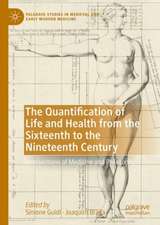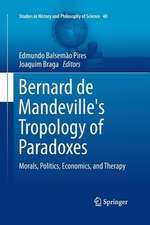Philosophy of Care: New Approaches to Vulnerability, Otherness and Therapy: Advancing Global Bioethics, cartea 16
Editat de Joaquim Braga, Mário Santiago de Carvalhoen Limba Engleză Paperback – 16 dec 2022
In this book, authors from a wide interdisciplinary spectrum discuss the issue of care. The book covers both philosophical and therapeutic studies and contains a three-pronged approach to discussing the concepts of care: vulnerability, otherness, and therapy. Above all, it is a matter of combining, in a plural form, a path with multiple theoretical and conceptual bifurcations, but which always point to an observation of society from the perspective of human vulnerability.
| Toate formatele și edițiile | Preț | Express |
|---|---|---|
| Paperback (1) | 894.03 lei 6-8 săpt. | |
| Springer International Publishing – 16 dec 2022 | 894.03 lei 6-8 săpt. | |
| Hardback (1) | 900.18 lei 6-8 săpt. | |
| Springer International Publishing – 10 dec 2021 | 900.18 lei 6-8 săpt. |
Din seria Advancing Global Bioethics
- 20%
 Preț: 630.48 lei
Preț: 630.48 lei - 20%
 Preț: 565.64 lei
Preț: 565.64 lei -
 Preț: 380.04 lei
Preț: 380.04 lei - 24%
 Preț: 738.44 lei
Preț: 738.44 lei -
 Preț: 426.34 lei
Preț: 426.34 lei - 15%
 Preț: 588.37 lei
Preț: 588.37 lei - 18%
 Preț: 895.27 lei
Preț: 895.27 lei - 15%
 Preț: 693.06 lei
Preț: 693.06 lei -
 Preț: 382.36 lei
Preț: 382.36 lei - 24%
 Preț: 629.21 lei
Preț: 629.21 lei - 24%
 Preț: 589.13 lei
Preț: 589.13 lei - 15%
 Preț: 645.60 lei
Preț: 645.60 lei - 24%
 Preț: 587.48 lei
Preț: 587.48 lei - 15%
 Preț: 643.65 lei
Preț: 643.65 lei -
 Preț: 391.22 lei
Preț: 391.22 lei - 24%
 Preț: 598.20 lei
Preț: 598.20 lei -
 Preț: 397.01 lei
Preț: 397.01 lei - 24%
 Preț: 581.34 lei
Preț: 581.34 lei
Preț: 894.03 lei
Preț vechi: 1090.28 lei
-18% Nou
Puncte Express: 1341
Preț estimativ în valută:
171.13€ • 185.94$ • 143.84£
171.13€ • 185.94$ • 143.84£
Carte tipărită la comandă
Livrare economică 22 aprilie-06 mai
Preluare comenzi: 021 569.72.76
Specificații
ISBN-13: 9783030751371
ISBN-10: 3030751376
Pagini: 366
Ilustrații: XI, 366 p. 1 illus.
Dimensiuni: 155 x 235 mm
Greutate: 0.53 kg
Ediția:1st ed. 2021
Editura: Springer International Publishing
Colecția Springer
Seria Advancing Global Bioethics
Locul publicării:Cham, Switzerland
ISBN-10: 3030751376
Pagini: 366
Ilustrații: XI, 366 p. 1 illus.
Dimensiuni: 155 x 235 mm
Greutate: 0.53 kg
Ediția:1st ed. 2021
Editura: Springer International Publishing
Colecția Springer
Seria Advancing Global Bioethics
Locul publicării:Cham, Switzerland
Cuprins
Introduction.- Part I - CARE AND VULNERABILITY.- Chapter 1 Care: A New Arrival in the History of Philosophy?.- Chapter 2 From an anthropology of vulnerability to the ethics of care.- Chapter 3 The Circles of Care – a Stoic Approach.- Chapter 4 The relation between care and despair, according to Kierkegaard.- Part II - CARE AND ECONOMY.- Chapter 5 Care Ethics and the Economy.- Chapter 6 Welfare, care and human economy in the theory of Wilhelm Röpke.- Chapter 7 Time, Space and Care.- Part III - CARE AND OTHERNESS.- Chapter 8 (Mis)understanding ἐπιμέλεια ἀρετῆς in Plato’s Euthydemus.- Chapter 9 The Care of Others in Marcus Aurelius’ Meditations.- Chapter 10 Care and compassion: a Buddhist contribution to the philosophy of care.- Chapter 11 Care in the Protection of the Patriarchal Family According to Francisco de Vitoria's 'De Restitutione'.- Chapter 12 Care: a virtue among virtues.- Chapter 13 On Women: an analysis about the status of women in Denis Diderot’s theory of Enlightenment.- Part IV - CARE AND THE SELF.- Chapter 14 Care of the self: the opposition between “φίλος αὑτῷ” and “σφόδρα ἑαυτοῦ φιλία” in Plato’s Laws.- Chapter 15 Cura personalis: The Care of the Person and the Roots of Jesuit Pedagogy.- Chapter 16 From Charity to the Care of the Self: Thomas Browne’s Religio Medici.- Chapter 17 Philosophy of Care and the Bildungsroman: Words and Facts in Goethe’s Wilhelm Meisters Lehrjahre.- Chapter 18 Care of oneself and the psychologycal clinic: kierkegaardian contributions.- Part V - CARE AND THERAPY.- Chapter 19 Acedia and its care.- Chapter 20 The different suffering modalities, from Paul Ricoeur’s text «Suffering is not the pain» and its relevance in the non-conventional therapies.- Chapter 21 The place of the experience of illness in the understanding of disease: Medical discourse and subjectivity.- Chapter 22 Take care of your mind: a short discussion between clinical hypnosis and philosophy of mind.- Index.
Recenzii
“As a palliative care physician, with dual expertise and interest in clinical ethics and bioethics, I found this book a breath of fresh air … . Editors Joaquim Braga and Mário Santiago de Carvalho have brought together a diverse and insightful group of thinkers and writers, and curated an excellent contribution to the theoretical discourse on care as it relates to our work and our world.” (Linda Sheahan, IAHPC Book Reviews, hospicecare.com, Vol. 23 (11), November, 2022)
Notă biografică
Joaquim Braga is researcher and professor at the Department of Philosophy of the University of Coimbra. He is also a member of the Research Unit “Institute for Philosophical Studies”. His graduation in Philosophy took place at the Faculty of Letter of the University of Coimbra. In 2010, at the Humboldt University of Berlin, he finished his PhD with a thesis based upon the philosophy of Ernst Cassirer. Currently, his research activity covers the fields of Picture Theory, Aesthetics, Philosophy of Culture and Modern and Contemporary Philosophy, with a special interest in symbolic thought. Inter alia, his works include Die symbolische Prägnanz des Bildes. Zu einer Kritik des Bildbegriffs nach der Philosophie Ernst Cassirers (Freiburg, 2012), Rethinking Culture and Cultural Analysis – Neudenken von Kultur und Kulturanalyse (Berlin, 2013), Leituras da Sociedade Moderna. Media, Política, Sentido (Coimbra, 2013), Símbolo e Cultura (Coimbra, 2014), Bernard de Mandeville’s Tropology of Paradoxes: Morals, Politics, Economics, and Therapy (Springer, 2015), Antropologia da Individuação. Estudos sobre o Pensamento de Ernst Cassirer (Porto Alegre, 2017), Conceiving Virtuality: From Art to Technology (Springer, 2019), Sensibilidade e matéria no pensamento de Denis Diderot (Coimbra, 2020), Michel Foucault e os Discursos do Corpo (Campinas, 2020), Teoria das Formas Imagéticas. Ensaios sobre Arte, Estética, Tecnologia (Coimbra, 2020).
Mário Santiago de Carvalho is Full Professor of Philosophy at the University of Coimbra and Scientific Coordinator of the R&D Unit, Instituto de Estudos Filosóficos (IEF). Author of several books and papers related to his main philosophical fields of research – Portuguese Aristotelianism, Medieval Philosophy, Metaphysics and Philosophy ofMusic – he has taught at other Universities, in Portugal and abroad, has translated Greek and Latin philosophical texts, and is currently supervising the bilingual edition of the Commentarii Collegii Conimbricensis Societatis Iesu.
Mário Santiago de Carvalho is Full Professor of Philosophy at the University of Coimbra and Scientific Coordinator of the R&D Unit, Instituto de Estudos Filosóficos (IEF). Author of several books and papers related to his main philosophical fields of research – Portuguese Aristotelianism, Medieval Philosophy, Metaphysics and Philosophy ofMusic – he has taught at other Universities, in Portugal and abroad, has translated Greek and Latin philosophical texts, and is currently supervising the bilingual edition of the Commentarii Collegii Conimbricensis Societatis Iesu.
Textul de pe ultima copertă
In this book, authors from a wide interdisciplinary spectrum discuss the issue of care. The book covers both philosophical and therapeutic studies and contains a three-pronged approach to discussing the concepts of care: vulnerability, otherness, and therapy. Above all, it is a matter of combining, in a plural form, a path with multiple theoretical and conceptual bifurcations, but which always point to an observation of society from the perspective of human vulnerability.
Caracteristici
Provides a multidisciplinary and historical-philosophical study on the various extensions of the concepts of "care" and "care practices" Increases the thematic fields of the philosophy of care and ethics of care Contributes to the philosophical enlargement of the semantics of care


















